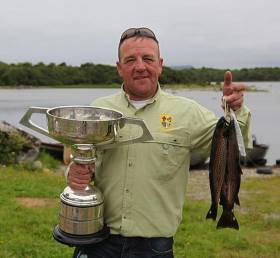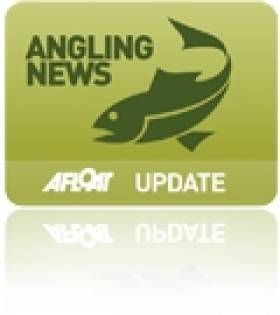Displaying items by tag: World Cup Trout Fly Angling Championship
Clare Angler Tops Trout Fly Worlds On Lough Mask
#Angling - Thomas O'Loughlin's impressive 12-fish catch was more than enough to snag him the top prize at the World Cup Trout Fly Angling Championship on Lough Mask recently.
The Corofin, Co Clare native's final bag of 13.43lbs was 50% larger than that of his closest rival Jonathan Craven of Connacht in the 60th running of the competition, which took place over five days ending on Monday 1 August, as the Clare Champion reports.
His victory marks the first for any Clare angler in the Lough Mask contest – but is just the latest in a series of accolades for 'Tommy', who comes from an experienced family of game anglers.
The Clare Champion has much more on the story HERE.
Biosecurity Initiative at Trout Fly Angling World Cup
#ANGLING - Inland Fisheries Ireland has teamed up with the committee behind the World Cup Trout Fly Angling Championship to develop a biosecurity initiative for the contest, taking place on Lough Mask from 2-6 August.
The premier event in the angling calendar will be contested by up to 500 keen fly fishermen from Ireland and abroad, each anticipating lifting the coveted World Cup.
The anglers that fish this competition realise the true gem that Lough Mask represents, providing quality angling in clean, unpolluted waters.
Towards that end, the biosecurity initiative aims to prevent non-native invasive species and harmful aquatic pathogens being inadvertently introduced into the lake on angling equipment.
Central to the initiative is that all anglers must disinfect their landing nets and boots each day before registering for the competition.
Anglers will be requested to co-operate with stewards on each morning and to bring their landing nets and boots with them to the registration centre. There, they will dip their gear in supervised disinfection tanks and receive a stamp from the Biosecurity Steward to show that they have used the facility.
Only anglers who can show this stamp to the Registration Officer will be registered to fish the competition on that day.
In recent years, despite considerable effort on behalf of IFI and many other angling and conservation groups, the non-native invasive Zebra mussel was introduced to Lough Mask.
Invasions elsewhere in Ireland's inland waterways include the notorious Asian clam, which has taken residence from the River Shannon to the Grand Canal.
The present biosecurity initiative - which follows the recent launch of a smartphone app to identify and report aquatic invasive species - represents an effort to make anglers aware of the dangers posed, and to alert them to the fact that other harmful and environmentally damaging invasive species are present on the island of Ireland, and that these can be inadvertently introduced to the lake on wet nets or soiled boots.
Information packages relating to the threats posed by invasive species will be available to anglers’ during the competition.

























































